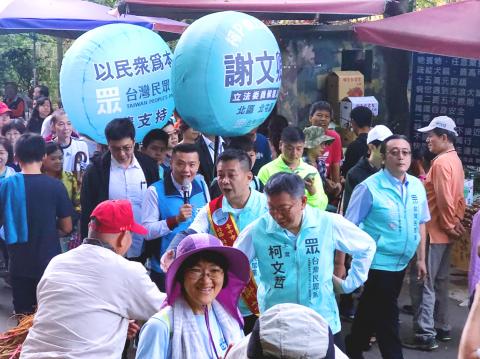Having three political parties in the legislature with each controlling less than half of the seats would be an important turning point for Taiwan’s politics, Taipei Mayor Ko Wen-je (柯文哲) said yesterday.
Ko, the chairman of the Taiwan People’s Party (TPP), made the remark on the sidelines of a campaign event for a TPP legislative candidate when asked about Hon Hai Precision Industry founder Terry Gou’s (郭台銘) comments about his ideal number of parties in the legislature.
Gou on Saturday said that having two major and two minor parties in the legislature would be ideal, as it would give people more options, as opposed to having one dominant party or two balancing parties.

Photo: Hsu Kuo-chen, Taipei Times
If there are two major parties and one minor party, the latter might become arrogant, he added.
Gou’s aides have been included in the TPP’s and People First Party’s (PFP) legislator-at-large nominee lists, and they are among the TPP’s legislative candidates for the Jan. 11 elections.
Ko said that Gou simultaneously supports the TPP and PFP, and probably supports some Chinese Nationalist Party (KMT) legislators, so he would want to expand his influence as far as possible.
However, in the single-district, two-votes system, it is difficult for “third force” parties to gain influence, Ko said.
Over the past two decades, the New Party, the PFP, the Taiwan Solidarity Union and the New Power Party have gained popularity, but then declined, he said.
“If third-force parties become ‘small pan-blue or pan-green parties,’ they would be repeating the failed experiences and will likely not succeed,” Ko said.
That is why the TPP emphasizes “national governance” and does not want to take part in the conflict between the pro-independence and pro-unification camps, he said.
Having three parties with each controlling less than half of the legislative seats would be a chance for Taiwan to “reboot,” Ko said.
Ko also talked about TPP legislator-at-large nominee Ann Kao (高虹安), who is the vice president of the Hon Hai Technology Group Industrial Big Data Office and considered to be among the so-called “Gou’s army.”
Gou had recommended a list of seven people and Kao was chosen as the most suitable nominee through internal party discussions, Ko said.
Ko said that the TPP’s candidates come from different fields, so he does not view Kao as being in Gou’s army, but as someone Gou had recommended.
He believes that “if everyone does what they should do to the utmost, the combined result would be the maximum benefit of Taiwanese society,” Ko said.
Additional reporting by CNA

‘DENIAL DEFENSE’: The US would increase its military presence with uncrewed ships, and submarines, while boosting defense in the Indo-Pacific, a Pete Hegseth memo said The US is reorienting its military strategy to focus primarily on deterring a potential Chinese invasion of Taiwan, a memo signed by US Secretary of Defense Pete Hegseth showed. The memo also called on Taiwan to increase its defense spending. The document, known as the “Interim National Defense Strategic Guidance,” was distributed this month and detailed the national defense plans of US President Donald Trump’s administration, an article in the Washington Post said on Saturday. It outlines how the US can prepare for a potential war with China and defend itself from threats in the “near abroad,” including Greenland and the Panama

A wild live dugong was found in Taiwan for the first time in 88 years, after it was accidentally caught by a fisher’s net on Tuesday in Yilan County’s Fenniaolin (粉鳥林). This is the first sighting of the species in Taiwan since 1937, having already been considered “extinct” in the country and considered as “vulnerable” by the International Union for Conservation of Nature. A fisher surnamed Chen (陳) went to Fenniaolin to collect the fish in his netting, but instead caught a 3m long, 500kg dugong. The fisher released the animal back into the wild, not realizing it was an endangered species at

The High Prosecutors’ Office yesterday withdrew an appeal against the acquittal of a former bank manager 22 years after his death, marking Taiwan’s first instance of prosecutors rendering posthumous justice to a wrongfully convicted defendant. Chu Ching-en (諸慶恩) — formerly a manager at the Taipei branch of BNP Paribas — was in 1999 accused by Weng Mao-chung (翁茂鍾), then-president of Chia Her Industrial Co, of forging a request for a fixed deposit of US$10 million by I-Hwa Industrial Co, a subsidiary of Chia Her, which was used as collateral. Chu was ruled not guilty in the first trial, but was found guilty

DEADLOCK: As the commission is unable to forum a quorum to review license renewal applications, the channel operators are not at fault and can air past their license date The National Communications Commission (NCC) yesterday said that the Public Television Service (PTS) and 36 other television and radio broadcasters could continue airing, despite the commission’s inability to meet a quorum to review their license renewal applications. The licenses of PTS and the other channels are set to expire between this month and June. The National Communications Commission Organization Act (國家通訊傳播委員會組織法) stipulates that the commission must meet the mandated quorum of four to hold a valid meeting. The seven-member commission currently has only three commissioners. “We have informed the channel operators of the progress we have made in reviewing their license renewal applications, and